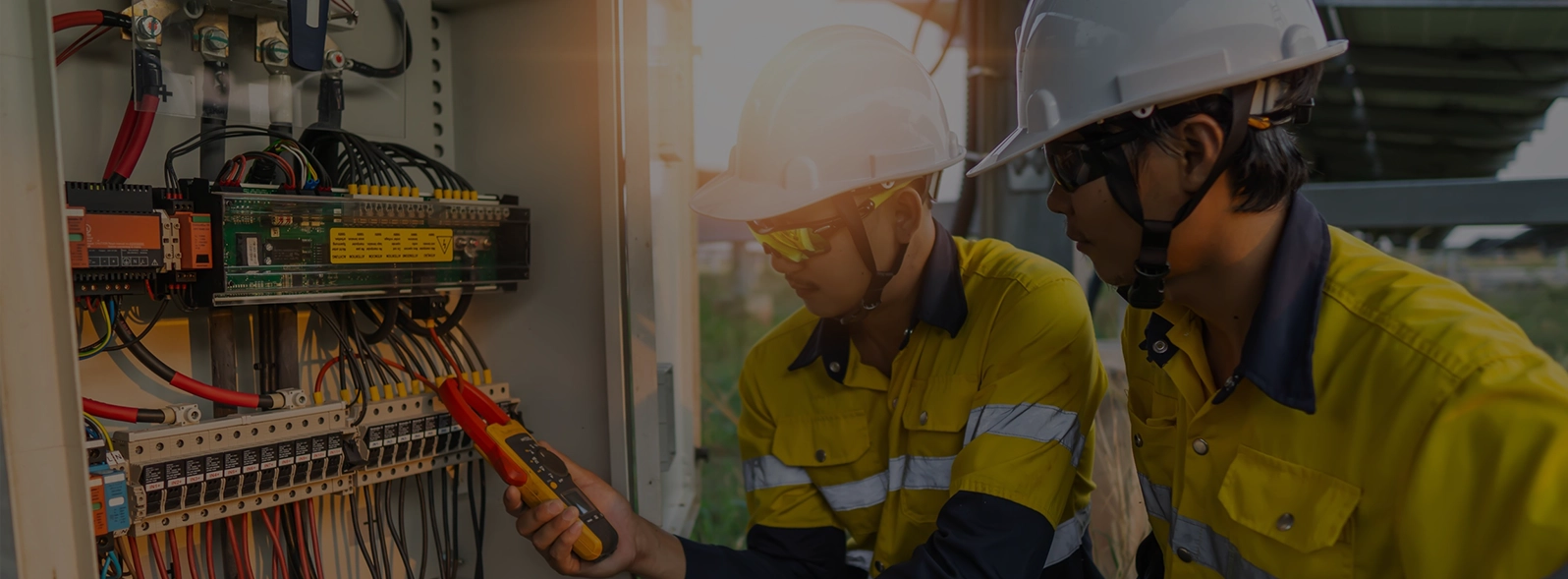If you have experience in residential electrical work, you can formalise your qualifications to become an industrial or commercial electrician. It can be confusing to know the difference between these two types of electricians, so we have created this guide to help you understand the key differences.
Why become a licensed electrician?
Electricians are in high demand in Australia. According to the Australian Industry and Skills Committee, the number of electricians employed in Australia has more than doubled in the last 20 years. With growth continuing, there is a constant need for qualified electricians to maintain and install electrical systems.
What’s the difference between industrial and commercial electricians?
While these professions require the same skills and qualifications, there are a few key differences between industrial and commercial electricians.
Industrial electricians
An industrial electrician is responsible for installing, maintaining, and repairing electrical systems in factories, buildings, hospitals, warehouses, mines and other industrial settings. They often work with large machines and equipment, so they need to be able to troubleshoot problems quickly and efficiently.
Industrial electricians regularly work with a diverse range of materials, including wires, conductors, conduits, generators, sensors, breakers, transformers, and everything else that makes up the electrical system. Duties for industrial electricians include installing and testing new equipment, maintenance and repairs of existing equipment, and troubleshooting issues with things go wrong.
Industrial electricians often work with high voltage components and are often exposed to live wires, conduits, and other electrician parts. Because this type of work can be dangerous, it’s important that electricians are licenced and experienced.
Commercial electricians
A commercial electrician is responsible for installing, maintaining, and repairing electrical systems in businesses and other commercial settings. They generally work in commercial locations such as retail stores and restaurants to guarantee that wiring and electrical components are operating correctly.
Commercial electricians typically install and maintain electrical equipment in office buildings or retail stores. They may also work on low-voltage systems, such as lighting and security systems. In addition to installation and maintenance, commercial electricians may also be responsible for testing equipment and troubleshooting electrical problems. They can serve a wide range of clients, including contractors, office workers, and building owners.
Commercial electricians may also design, plan, and diagram electrical systems that are tailored to a company’s specific demands.
Before You Branch Out
If you have your current certifications as an electrician, you don’t need to be re-certified to work commercially. This is because many commercial electrical systems are similar to those utilised on a residential level. They’re also similar to industrial systems, though industrial electricians operate on a much larger scale, in different environments and with different types of tasks.
These extra electrical qualifications, like the electrician qualifications offered through Recognition of Prior Learning (RPL), showcase your capabilities as a licensed electrician, so you can get out of residential and to move into the commercial or industrial field.
If you’re considering branching out as an industrial or commercial electrician in the trade, here are a few things you need to know first.
Get Qualified
Having industrial or commercial electrical qualifications will show prospective employees you know what you’re doing when it comes to working with electrical systems. Competency is key in this area. Electrical systems carry an inherent danger that you must be knowledgeable and respectful of. Qualifications will demonstrate that you know how to choose, set-up, install, test, troubleshoot and repair electrical systems and equipment. It will also demonstrate familiarity with safety protocols surrounding the use of electrical systems.
If you don’t already have your qualification, you can find out more about getting your Certificate III in Electrotechnology Electrical – UEE30811 by Skills Training Australia Group Pty Ltd (RTO: 91511) to help you get started.
Enjoy Job Flexibility
One of the great things about being a licensed electrician is that it generally offers you the capability to be supremely flexible with your work. Once you have your license as an electrician, you can take on many different types of jobs. And when you have qualifications in specific electrician courses, you can work on different types of equipment. In some spaces, there is a huge amount of job flexibility, allowing you to move on to the next job if you decide to not renew your contract. If you work for yourself, you can take on whatever job you want.
Understand The Pay Scale
While the basic qualifications are very similar, industrial electricians often work on larger types of electrical machinery, in different (sometimes more challenging) environments. One consideration is that, because of their special skills and ability to work on a particular type of electrical system, industrial electricians setting are sometimes paid more than their commercial counterparts.
According to talent.com, electricians are paid on average just over $83,000 per annum, while industrial electricians are paid $90,000 per annum. A commercial electrician on the other hand averages $81,000 per annum.
Get Certified
Skills Certified Australia can help you get you one step closer to full licensure as a certified electrician. We will guide you through the entire RPL process, from assessing your eligibility to providing guidance on the evidence you need to provide. We also offer support with finding a registered training organisation (RTO) that offers the qualification you are interested in.
If you think RPL might be the right option for you, then get in touch with Skills Certified Australia today. We will assess your eligibility and help you through every step of the way.















